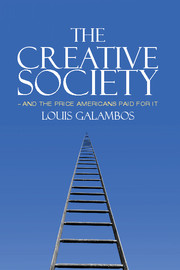Book contents
- Frontmatter
- Contents
- Preface
- 1 1931
- 2 Life, Death, and Learning in the Cities
- 3 Toward a New Economy, 1890 to 1930
- 4 State Crafting – American Style
- 5 Confronting the World
- 6 Winners and Losers, 1890 to 1930
- 7 New Deal Experiments
- 8 Fighting On God’s Side
- 9 The New Aristocracy, 1946 to 1969
- 10 The Suburban Conquest of the 1960s
- 11 Empire in the American Century
- 12 The Tattered Empire of the 1970s
- 13 The Cracked Core
- 14 The American Solution, 1981 to 2001
- 15 Conservatism: Rhetoric and Realities, 1981 to 2001
- 16 The Hegemony Trap
- 17 The American Dream, 1981 to 2001
- 18 The Creative Society in Danger
- Acknowledgments
- Index
- References
8 - Fighting On God’s Side
Published online by Cambridge University Press: 05 June 2012
- Frontmatter
- Contents
- Preface
- 1 1931
- 2 Life, Death, and Learning in the Cities
- 3 Toward a New Economy, 1890 to 1930
- 4 State Crafting – American Style
- 5 Confronting the World
- 6 Winners and Losers, 1890 to 1930
- 7 New Deal Experiments
- 8 Fighting On God’s Side
- 9 The New Aristocracy, 1946 to 1969
- 10 The Suburban Conquest of the 1960s
- 11 Empire in the American Century
- 12 The Tattered Empire of the 1970s
- 13 The Cracked Core
- 14 The American Solution, 1981 to 2001
- 15 Conservatism: Rhetoric and Realities, 1981 to 2001
- 16 The Hegemony Trap
- 17 The American Dream, 1981 to 2001
- 18 The Creative Society in Danger
- Acknowledgments
- Index
- References
Summary
World War II changed America and the rest of the world in ways impossible to predict in the late 1930s. The war transformed the country’s international relations, drew three new professional elites into the top tiers of the nation’s power structure, and opened the door to an “American Century” that was more frightening and more rewarding than anything the country had experienced since the Civil War. None of these changes could be anticipated in 1939, when the war began in Europe. Then, the United States was turned inward, still struggling with the problems of the depression, still trying to find the government policies that would restore prosperity. Most Americans wanted nothing to do with another European war. It was better, they thought, to stay safe, isolated in Fortress America from the European struggles.
By September, 1941, however, in the big northeastern cities like Boston and New York, anxious eyes looked toward Europe where the powerful Nazi war machine had occupied Belgium, the Netherlands, and most of France. After invading Denmark and Norway, Hitler’s forces had swept into the Soviet Union, conquering most of the Ukraine and threatening Moscow. Germany’s new ally, Japan, was continuing its conquest of China and Indochina, a Far Eastern war that was starting to cause nervous tremors in the cities along America’s Pacific coast. Even to the east of the Rocky Mountains and through Midwestern farm country, in little towns like Princeton and Fostoria, there was now some interest in wars that were threatening, although still distant. In Washington, DC, in the White House and the State Department, there was deep, growing concern about an international struggle that might any moment involve the United States.
- Type
- Chapter
- Information
- The Creative Society – and the Price Americans Paid for It , pp. 113 - 131Publisher: Cambridge University PressPrint publication year: 2011



